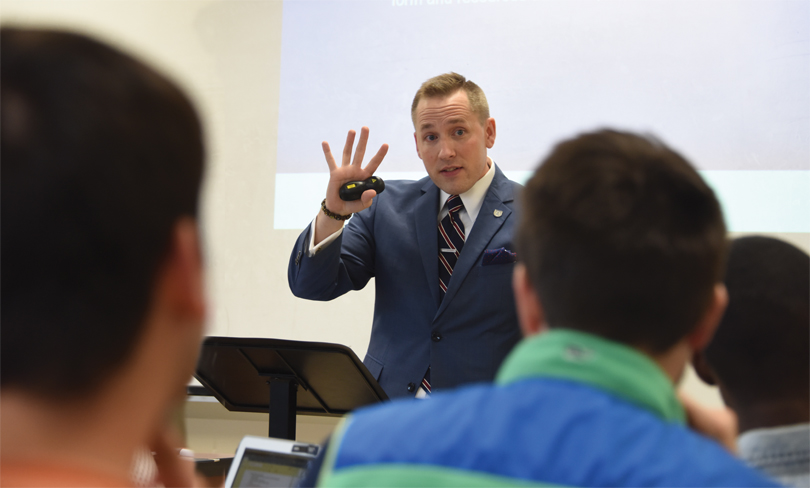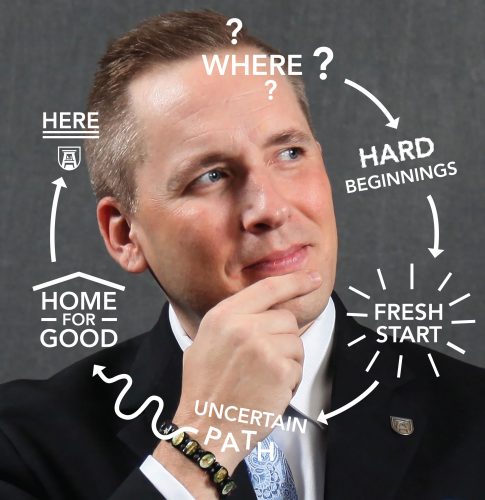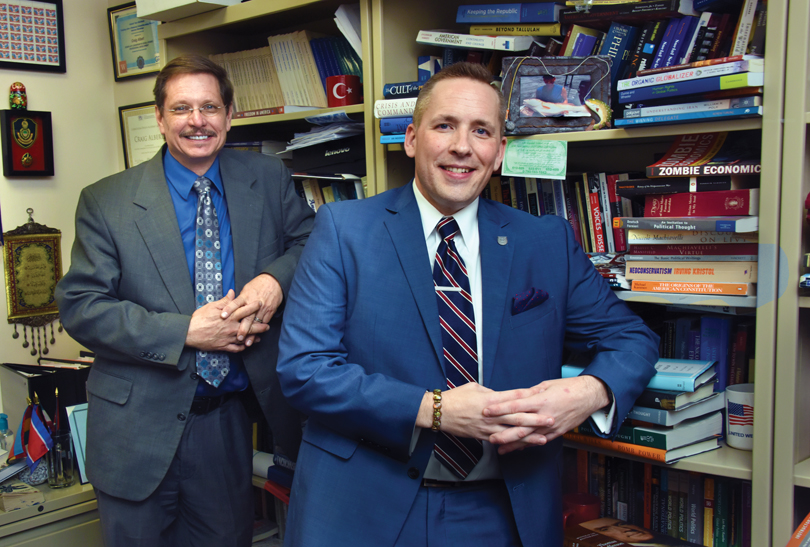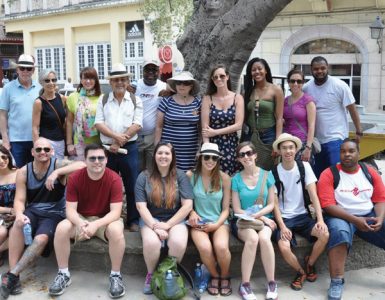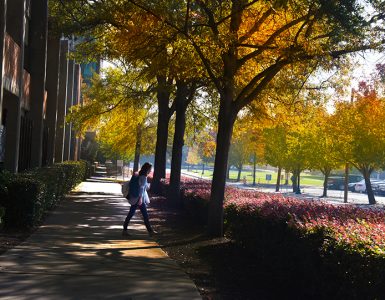If you knew Craig Albert (’01) back in high school, back when he was a punk kid who’d all but given up on a legitimate future, you never would have expected him to be in a stable career at this point in his life, much less a tenured professor of political science and the director of Augusta University’s new Master of Arts in Intelligence and Security Studies program.
And yet that’s just where he is — the only place now he really wants to be. How he got here, though, was never predictable or pretty. Which is only fitting, because people like Albert, the people who really claim their space and leave their mark, seldom lead tidy lives. Their progress can’t be neatly plotted or easily summarized. It comes, if it comes, in fits and lurches, false starts and leaps of faith. It’s why we’re drawn to them, after all. They’re curious, they’re charismatic and they’re absolutely spinning with contradictions.
And yet, while you never could have predicted this is where he’d end up, when you hear his story, it’s hard to imagine he could have ended up anywhere else. As messy as it is, there’s a touch of inevitable about it.
Hard Beginnings
The child of a single mother growing up in Hephzibah, Georgia, Albert was a lost soul pretty much from the beginning. An indifferent student who struggled without his father, a career soldier who was seldom in the picture, he was the kind of class clown headed swiftly down the wrong path.
“I got a little too much into the bad side of being a kid” is how he puts it, and the fact that he doesn’t elaborate, you assume, speaks volumes about just how far into the bad side of being a kid he really was.
By his junior year, things were coming to a head. By then he’d had some close calls in some fights and a couple of his friends had gotten into serious trouble with the law.
In spite of this downward trajectory, not everyone was willing to write him off, however. Not just yet, anyway. Someone at the high school suggested him for the AP program, and there, for the first time in his life, he actually read a book. Really read a book. First one, then another. Then another. Fahrenheit 451. Brave New World. A lesser-known dystopian classic called Fatherland.
“When I read 1984, it just blew me away,” he says. “I’d never experienced the feeling that I was in a book before.”
At the time, though, all this stuff was behind the Literature Door, a door he wasn’t much interested in going through. But the thing about doors — they don’t have to lead to just one place. While the books may have been considered literature, what was inside them — what they were about — had to do with politics and political theory, and for Albert, that was something that did interest him. So, tentatively, he went through.
“There is nothing in life that doesn’t tie back to politics,” he says now. Politics excites him that much. “I tell students entering my 1101 class that politics is the map of the soul.”
He also tells these freshmen — most of them right out of high school — that the purpose of the class is to teach them the meaning of life, and though they’re skeptical and many want to drop the class right then and there, he begs them to give him a month because he still can remember being them, still remember the uncertainty and confusion of freshman year. Because even though he went through that door and got his first taste of being inside the arena of Great Thoughts, it wasn’t exactly groundbreaking. It was the first of many course corrections — and the dim awareness of an interest he never suspected — but it would take more than that to get him where he is today.
So much more.
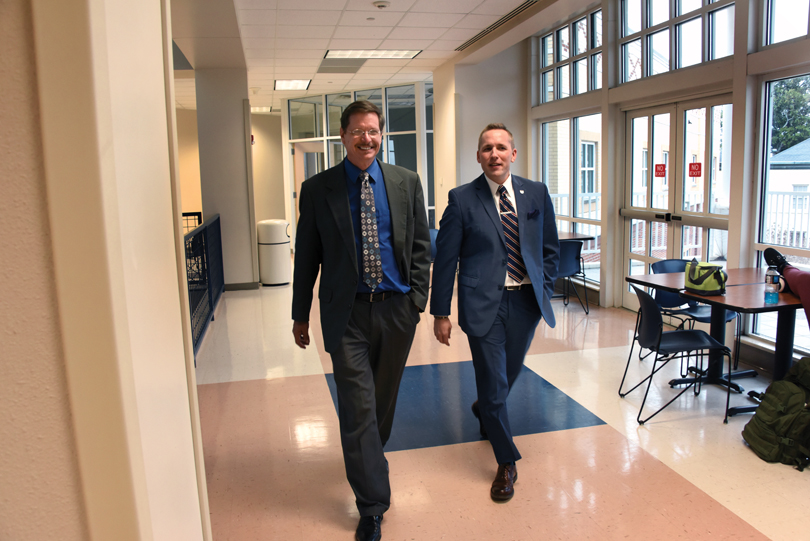
Fresh Start
Limping out of high school, barely qualifying for HOPE, he ended up at Augusta State University in 1997. Like many of his 1101 students, he ended up here because it was close, convenient and because it seemed like something he should do. And sitting there in class, an uncertain freshman overwhelmed with new choices and endless horizons, he met the professor he now tries to be. After meeting Dr. Ray Whiting, his political science professor, he fell in love with it all. With learning, with belonging, with everything.
Here, we’re not talking course correction. Here, we’re talking life changing in the fullest sense.
“He showed me what education can be and what college can be,” Albert says. “And from there, I bonded with the institution. I bonded with the faculty.”
But most significantly, he bonded with Whiting.
“He saw that he was touching me,” Albert says. “And I think he realized I had some potential I didn’t know about, that I was somebody who could have a future.”
It wasn’t just lip service or a pep talk, though. Whiting embraced the role with all the heavy lifting that went along with it.
“I think he knew that he was becoming a father-like figure to me, but he took it on the way one ought to — with discipline,” Albert says. “He was very strict.”
And while that discipline was something Albert secretly craved, it wasn’t always well received.
“I used to refer to Craig jokingly as the son I wish I’d never had,” Whiting says.
It’s a joke often repeated by Albert himself — “I’m the son he never wanted” — but whether wanted or not, he was the son Whiting got. Almost immediately, Whiting identified him as someone with a potential for leadership, and as such, he challenged him with things worthy of someone with a future.
“Apathy is the antithesis of leadership,” Whiting says, and in Albert he found a student with no sense of apathy and someone who was empathetic as well.
While all this seems tailor-made for a happy ending, or at the very least the feel-good sigh of a chapter coming to a close, it’s not. Not by a longshot.
Uncertain Path
Despite graduating with a 3.8, Albert didn’t have a grad school to go to, and without a grad school, his goal — at this point, his goal was making it into the CIA — was as good as dead. Worse, he had no one to blame but himself. Being cocky, he applied only to one school, and that school — George Mason University — didn’t take him. Didn’t even wait-list him. Which left his dreams dead in the water.
No grad school, no CIA.
Confused and bitter, he did what was familiar — he fell back in with the wrong crowd and resumed getting into trouble. Whiting had fixed a lot, Albert says, but not everything.
“I was probably the most anxious I’ve ever been in my life,” he says.
Eventually, he got into the University of Connecticut — provisionally — and although he excelled there, even being named Professor of the Year as a grad student, he couldn’t shed his destructive tendencies. In the end, he lived a kind of double life. He was writing papers and presenting them at conferences — being professional when required — but at night it was a very different story.
Then, one day, a burst of insight: for all his learning about virtue and for all his study about what it meant to live a good life, he wasn’t practicing any of it. Socrates, he says, would have been disappointed in him.
Lost, he confided in a friend, who invited him to Catholic Mass. It was something his friend — his best friend — had been doing for a year without telling him.
It’s here, Albert hit rock bottom. What kind of person must
I be, he thought, if my best friend didn’t feel he could tell me about something as important as that?
The decision to join his friend at Mass was another of those life-changing events. Catholicism gave him grounding at a time when he desperately needed it. This was after his master’s, when despite the fact he was following through to his PhD, it was clear he wasn’t going into the CIA. Though he was continuing to work toward his doctorate, he didn’t really know why. At this point, he didn’t really want to be in academia, and if not there, then where?
It was a familiar feeling of indecision, but this time instead of indulging in the destructive pursuits of the past, he started turning to healthier habits, seeking mentorship as he went. From Whiting, with whom he’d remained close, and from others, particularly those in the Catholic Church, which was now increasingly his home.
After finishing his PhD, he came back to Augusta, lived with his mother and took a job as a temporary instructor at his alma mater so he could contemplate the priesthood.
Contemplate meaning prepare. Contemplate meaning get ready to go.
“The day I got to Augusta, I started the application for the priesthood,” he says.
While he prepared, he taught. And while he taught, it crossed his mind that he could actually be somebody’s Ray Whiting, that he could inspire people — teach people about empathy, about love, about leadership — from the classroom, just as Whiting had.
“Teaching is my gift,” he says. “I’m not trying to sound arrogant, it’s just the only thing I’m good at. It’s the only thing I can do naturally.”
But like the awareness that came with those first books he read, it was just an understanding — it came and it went. The goal now — and it was definitely a goal — was the priesthood, and nothing, certainly not a random thought, was going to get in the way of that.
And this right here might have been Albert’s happy ending if not for the dreams.
Each night while visiting the seminary — five nights in a row — he was visited by dreams of marriage. Not to a specific person — he’d stopped dating a while back and had lived a relatively monastic life for quite a while — but of marriage in general, which was even more surprising, since he’d never been the marrying kind.
It was also disappointing.
“I went back to my spiritual director and told him I thought God was trying to tell me something,” he says. “And that hurt, because I’m like, man — if God doesn’t want me to serve him, what’s my purpose?”
So on the advice of his spiritual director, he took a year off, tried dating, got promoted to a permanent lecturer and started getting publications. Eventually, a tenure-track position opened up, he met the girl who would become his wife and decided that being someone’s Ray Whiting was what he wanted to be.
“That’s when things really started to make sense in my mind,” he says. “I’m not supposed to be in the CIA. I’m not supposed to be a priest. I’m supposed to be in the classroom.”
And Whiting, who as an Episcopal priest knows a thing or two about service, agrees 100 percent.
Home for Good
“He throws himself into teaching with the same energy he would have in the priesthood,” Whiting says. “It’s all a vocation. It’s all a calling.”
So while here we’re pretty much at our happy ending, it’s not the end of the story — not by a long shot. And that’s a good thing, because the story gets so much better. Because it’s here — right here — where you start to get that feeling of the inevitable.
Albert began the next phase of his professional life where it all began — and not just at the university where he found himself. The full-time position that opened up? It opened up because Whiting decided to move into administration.
It only gets better. Not only did Albert take Whiting’s job, he inhabited his office as well, and while the office is now full of the trinkets unique to Albert — the Russian nesting dolls, the Walking Dead figures, the pandas and all the other things that help him meet his students where they are — the office itself feels like a shrine to Whiting. The bookshelves are his, the desk is his. The filing cabinets. The stool.
“I’m keeping them for him,” Albert says. “The same with the painting.”
The painting, called We Hold These Truths, is different from the other stuff. It’s a hard thing for some to look at and even harder for others to see. But it stands out, even in such a busy office. Juxtaposing images of racial struggle — some positive, some brutal — atop a bicentennial flag, it demands to be noticed.
It was painted by Whiting’s mother in 1976, and it’s been with Whiting since he first came to Augusta, serving as a conversation starter for more important discussions than he can count.
“I’ve had many wonderful conversations with students about it,” says Whiting, who served on the Episcopal Church’s anti-racism commission. “I’ve had a number of African-American students ask about it, and I’ve even had some of them come back to Augusta after law school and tell me they wanted to buy the painting.”
And now that it’s in Albert’s office, hanging exactly where it hung when it was Whiting’s office, it continues to be the starting point for important conversations.
“That painting is there to remind us that although we have so much potential in this country, we’re not there yet — we still have a long way to go,” Albert says. “Maybe we’ll reach that post-racial society one day, but we’re still going to be discriminating against other people and other identities. So that painting reminds us that there are always forgotten individuals, oppressed individuals, individuals who are discriminated against, and that we can’t give up.”
Ironically, he says, the Trump presidency is serving much the same purpose.
“I think Trump is the perfect president for making us have tough conversations,” he says. “It’s uncomfortable and it’s tough, but we’ve got to have them, because not having them obviously didn’t work.”
Though people work hard to avoid it, Albert says discomfort is a central element of both education and life.
“You can’t grow without being uncomfortable,” he says. “You don’t know how to think about a series of issues if nobody has ever challenged you on those issues.”
That, he says, is ultimately the value of a liberal arts education, and the reason he never wanted to teach anywhere but Augusta University.
“It was never about being a professor anywhere else,” he says. “I want to do it here. I want to inspire students here and give back to the school that gave me everything.”
His happy ending, it would seem, is just beginning.
